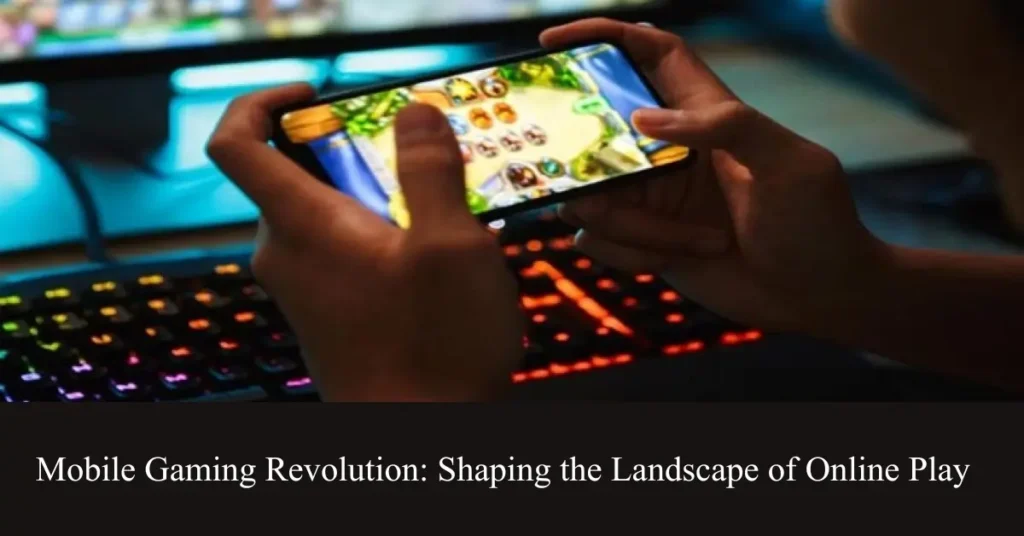The Mobile Gaming Revolution
In the fast-paced world of digital entertainment, few phenomena have captured the attention of both casual players and industry experts alike quite like the rise of mobile gaming. With the advent of smartphones and tablets, gaming has become more accessible and ubiquitous than ever before. This article explores how the mobile gaming revolution is reshaping the landscape of online play, captivating audiences worldwide.
The Rise of Mobile Gaming
A Shift in Gaming Habits
Gone are the days when gaming was confined to consoles or PCs. Today, millions of users turn to their mobile devices to indulge in a quick gaming session during their commute, lunch break, or leisure time at home. The portability and convenience offered by smartphones have revolutionized how people engage with games.
Accessibility and Convenience
Unlike traditional gaming platforms that require dedicated hardware and setup, mobile gaming offers unparalleled accessibility. With just a few taps on a touchscreen, users can dive into a diverse array of link slot games, ranging from casual puzzles to immersive role-playing adventures. The ease of access has democratized gaming, attracting a broad demographic of players.
Key Players in the Mobile Gaming Industry
Established Developers
Leading game development companies have embraced the mobile platform, leveraging their expertise to deliver high-quality gaming experiences. Titles from renowned studios such as Electronic Arts, Gameloft, and King have dominated app stores, setting the bar for innovation and polish in mobile gaming.
Indie Game Studios
In addition to industry giants, independent developers have thrived in the mobile gaming ecosystem. With lower barriers to entry and a global audience hungry for fresh content, indie games have gained traction, offering unique gameplay experiences and artistic expression.
Technological Advancements Driving Mobile Gaming
Graphics and Processing Power
Advancements in mobile hardware have propelled gaming to new heights, with smartphones boasting powerful processors and stunning displays. As a result, mobile games can rival the visual fidelity and performance of traditional console titles, blurring the lines between platforms.
Augmented Reality (AR) and Virtual Reality (VR)
The integration of AR and VR technologies has unlocked immersive gaming experiences on mobile devices. From Pokémon GO’s augmented reality gameplay to VR-enabled adventures, these innovations push the boundaries of what’s possible in mobile gaming.
Social and Community Aspects of Mobile Gaming
Multiplayer Features
Mobile games have evolved beyond solitary experiences, embracing multiplayer functionality to foster social interaction and competition. Whether teaming up with friends or facing off against rivals worldwide, multiplayer modes add depth and longevity to mobile titles.
In-Game Chat and Communities
In-game chat features and community forums enable players to connect, strategize, and share experiences within the gaming ecosystem. These social elements cultivate a sense of belonging and camaraderie, transforming gaming into a communal activity.
Monetization Strategies in Mobile Gaming
Freemium Model
Many mobile games adopt a freemium model, offering free downloads with optional in-app purchases for virtual goods or premium content. This approach maximizes accessibility while providing developers with avenues for monetization and ongoing support for their titles.
In-App Purchases
From cosmetic skins to power-ups and loot boxes, in-app purchases generate substantial revenue for mobile game developers. While criticized for potential exploitation and pay-to-win mechanics, these microtransactions remain a cornerstone of the mobile gaming economy.
Impact on Traditional Gaming Platforms
Console and PC Gaming
The rise of mobile gaming has not gone unnoticed by the established players in the gaming industry. Console and PC manufacturers have adapted to the shifting landscape by exploring mobile integration and cross-platform compatibility, blurring the boundaries between different gaming ecosystems.
Cross-Platform Integration
Cross-platform play has emerged as a key trend, allowing gamers to seamlessly switch between devices without losing progress or connectivity. Titles like Fortnite and Minecraft showcase the potential for unified gaming experiences across mobile, console, and PC platforms.
Challenges and Opportunities in Mobile Gaming
Device Fragmentation
The diverse array of mobile devices presents a challenge for developers, who must optimize their games to run smoothly across various hardware configurations. Balancing performance and compatibility remains a constant struggle in the ever-expanding mobile market.
Market Saturation
As the mobile gaming market becomes increasingly saturated, standing out from the competition poses a significant challenge for developers. Success hinges on innovative gameplay mechanics, compelling narratives, and effective marketing strategies to capture and retain players’ attention.
Future Trends and Innovations
Cloud Gaming
The emergence of cloud gaming services promises to revolutionize how games are accessed and played on mobile devices. By streaming content directly from remote servers, cloud gaming eliminates the need for powerful hardware, opening up new possibilities for gaming on the go.
Blockchain Integration
Blockchain technology holds the potential to disrupt the mobile gaming industry, offering solutions for digital asset ownership, secure transactions, and decentralized gaming platforms. From non-fungible tokens (NFTs) to blockchain-based gaming economies, the future of mobile gaming is ripe with innovation.
Conclusion: The Ever-Evolving Landscape of Mobile Gaming
In conclusion, the mobile gaming revolution has fundamentally transformed the way we play and interact with games. From casual diversions to immersive experiences, mobile gaming offers something for everyone, shaping the future of slot online play. As technology continues to evolve and consumer preferences evolve, the mobile gaming landscape will remain dynamic and full of potential.
